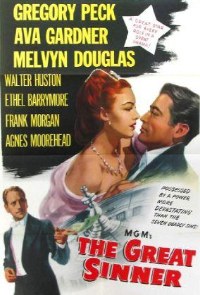Robert Siodmak (and Mervyn LeRoy) directed The Great Sinner, a philosophical drama based on Fyodor Dostoyevsky 1866 short novel “The Gambler,” starring Gregory Peck and Ava Gardner in the first of their three teamings together.
| The Great Sinner | |
|---|---|

Theatrical poster
|
|
Our Grade: B- (*** out of *****)
During the 1860s in Wiesbaden, Pauline Ostrovsky, a reformed addict, receives a manuscript from the dying writer Fedya, in which he looks back at their first meeting: While traveling from Moscow to Paris, Fedya meets Pauline and falls for her.
Noticing she is disembarking at Wiesbaden, Fedya decides to leave the train and follows her to a casino. Pauline, like her father General Ostrovsky, is a gambling addict. Interested in the effects of gambling, he decides to stay in Wiesbaden and study gambling addicts, such as Aristide Pitard, an old thief who steals Fedya’s money.
Taking pity on the man, Fedya offers Aristide money to leave the city, but instead, Aristide uses the money to gamble and he eventually shoots himself in desperation. Before dying, he gives Fedya a pawn ticket and asks him to redeem it and return the article to its owner, but he dies before divulging that person’s name.
At the pawnshop, Fedya discovers that the pledged item is a religious medal that belongs to Pauline. Meanwhile, he has fallen deeply in love with her, despite her father’s discouragement.
After returning the medal, Fedya finds out Pauline is pledged to arranged marriage with Armand de Glasse, the casino’s wealthy, ruthless manager. Aware that Pauline is not engaged to Armand out of love, but as a payment for her father’s big debts to the casino, Fedya decides to start gambling himself to earn enough money to pay off the General’s debts. However, after his winning streak, his luck runs out and he loses all his money.
Fedya is forced to borrow money from Armand to continue gambling, and even pawns his possessions. Broke, Fedya has a vision in which Aristide hands him a gun to shoot himself. Delirious, he grabs Pauline’s medal and attempts to sell it to pawnbroker Emma Getzel.
In the end, Fedya completes his manuscript and turns back to Pauline, who forgives him.
MGM bought the rights to the novel, and for its adaptation, the writers used elements of Dostoyevsky’s life and his other novel “Crime and Punishment.” The studio wanted the film reshot with “a stronger love story,” and when Siodmak refused to that, director Mervyn was brought in as replacement.
Despite the high-caliber cast and production values, The Great Sinner flopped at the box office; it id not even recover its production budget. However, in subsequent years, The Great Sinner has been reevaluated (by Scorsese and others), who elevated the stature of the picture by emphasizing its ambitions and good elements, largely shot by German-born filmmaker Siodmak.
The final cut of the movie, which due t com promises felt pompous and ponderous–failed to convey Dostoevsky’s brilliant insights about the psychology of gambling.
Screenwriter Christopher Isherwood, one of the novel’s adapters, took partial responsibility for the shortcomings, claiming that the source material was at once too literary and philosophical for a star-driven mainstream Hollywood picture.
Cast
Gregory Peck as Fedya (diminutive of Fyodor)
Ava Gardner as Pauline Ostrovsky
Melvyn Douglas as Armand de Glasse
Walter Huston as General Ostrovsky
Ethel Barrymore as Grandmother Ostrovsky
Frank Morgan as Aristide Pitard
Agnes Moorehead as Emma Getzel
Friedrich von Ledebur as Casino Secretary
Ludwig Donath as Doctor
Credits:
Directed by Robert Siodmak (and Mervyn LeRoy)
Produced by Gottfried Reinhardt
Screenplay by Christopher Isherwood, Ladislaus Fodor, René Fülöp-Miller, based on the 1866 short novel, “The Gambler” by Fyodor Dostoyevsky
Music by Bronisław Kaper
Cinematography: George J. Folsey
Edited by Harold F. Kress
Distributed by Metro-Goldwyn-Mayer
Release date: June 29, 1949
Running time: 110 minutes
Budget: $2,075,000
Box office: $2,041,000
Note:
TCM showed the movie on June 11, 2020.










